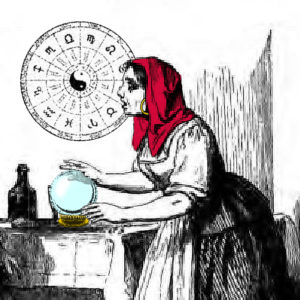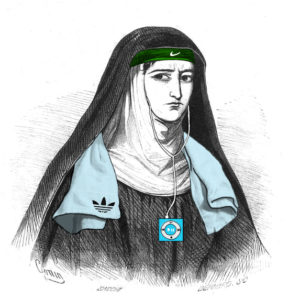Today I won’t talk about Coronavirus. In these times, even soubrettes have their say on the virus, its genesis and its treatments; so I will abstain from doing so. Instead, I will tell you about syndromes that according to the definition of the Health Dictionary are “complexes of symptoms that appear associated so as to configure a characteristic [morbid] picture”. The syndromes that I will present are of psychological or characterial nature and I have seen them develop exponentially in recent weeks. I called them by the names of the characters of The Betrothed because it is the greatest Italian novel and in it we recognize ourselves and many of the people who are close to us. I am sure that you too will diagnose your relatives and friends with one or more of these syndromes. If I forgot any of them, please let me know and it will be added to our manual.
Warning: this text has no scientific value. This is a cloistered divertissement and is the result of a collaboration between the author, a literary consultant, hardcore fan of Manzoni (Bianca Mussini), and a brilliant creative graphic designer (Francesco Maria Mussini).
Don Ferrante Syndrome

The pedant that cannot see for trying, and who has read many books, but has learned little of reality. He is a man to whom a bookish culture acts as a screen and prevents him from seeing things as they are. Don Ferrante is a secondary character, but Manzoni is keen to describe his end in detail. With the approach of the plague, Don Ferrante derides his worried peers and, making himself strong with Aristotle’s authority, claims that since the plague is neither substance nor accident, it does not exist and so that “he took no precaution against the plague; the plague got him; he went to bed, to die, like a hero of Metastasio, taking it out on the stars. ” (ch. 37)
The individuals affected by the Don Ferrante syndrome, also called denialists, were those who, especially at the beginning of the Coronavirus epidemic, claimed that it was a common flu or that it was the result of a gigantic media frame. Those affected by this syndrome are now few, but remain fierce.
Don Rodrigo Syndrome

Manzoni tells us that Don Rodrigo, the villain of the novel, spent time with “friends who are used to quarreling together, to pass the melancholy of that time” (ch. 33). He is the imposing reveler who exorcises fear with wine and gozzle.
The people more severely affected by Don Rodrigo Syndrome are the Milanese jocks who have crowded the Navigli in the previous weeks and the young folks who have filled the squares and bars of all Italy, drooling spritzes and aperitifs plastering their pictures on Instagram, until it has been expressly prohibited by the authorities, even if it had already been strongly discouraged by the health professionals. Fortunately, Don Rodrigo syndrome has almost disappeared today in Italy, but it is unclear if it is because of actual healing or as a consequence of restrictive measures.
Fra Cristoforo Archetype

That of Fra Cristoforo is not a syndrome and is not a pathology, it is rather an archetype, that is, a model, a specimen. The Manzonian character, possibly based on a historical character (fra Cristoforo Picenardi da Cremona), represents dignity, courage, Christian heroism. After a comfortable and simple youth, ended by a duel for futile reasons in which he kills his opponent, Ludovico becomes a Capuchin friar and dedicates his whole life to helping, comforting, and supporting the poor he meets on his way. He will die taking care of the plague victims in the Milan hospital.
Without irony or rhetoric, I would say that Fra Cristoforo represents the model for all nurses, health workers and doctors who are facing the Coronavirus epidemic with exhausting shifts, weeks of voluntary isolation and a very high level of risk despite protective measures. Our admiration and gratitude goes to them. And Manzoni would agree.
Don Abbondio Syndrome

The coward cleric is the clergyman who stands at the antipodes of Fra Cristoforo. His refusal to celebrate the marriage between Renzo and Lucia, for fear of reprisals from Don Rodrigo, is the beginning of all the misadventures of the young couple. Fear is Don Abbondio’s existential condition: he is afraid of the threats of the “bravi” (thugs), he is afraid of Renzo’s anger, he is afraid of the Cardinal’s reproach, he is afraid of the plague. His fears often turn into phobias, or “pauraccia”, as Manzoni calls it. Fear per se is a normal and human reaction to an imminent danger, and is often indispensable to trigger the survival instinct. To give a current example, if the fear of coronavirus infection pushes us to stay at home, it is a wise adviser and must be listened to. But Don Abbondio’s “pauraccia” (or phobia) pushes him to make selfish and irrational decisions, which often have disastrous consequences for others.
The effects of the Don Abbondio syndrome in the current emergency situation can be identified among the compulsive accumulators (hoarders) that we find in line in supermarkets with overflowing shopping carts of toilet paper and bottles of water, two goods that have no specific link with the coronavirus epidemic. Everyone now knows, even those affected by Don Abbondio syndrome, that dysentery and diarrhea are symptoms of cholera, but not of Covid-19, and we all know that the water of Italian cities is very controlled, safe, often good to drink and can easily replace the one in the bottle.
“Pauracce” and phobias, however, unlike fear, cause selfish behaviors that harm others. As Don Abbondio’s fearful refusal to celebrate the wedding is the direct cause of all the misfortunes of the engaged couple, the senseless accumulation of goods in supermarkets results in a complete lack of those goods for others.
Perpetua Syndrome

Don Abbondio’s maid became so famous that she gave her name to a profession. She is a woman of the people, wise and with great common sense, she likes to chat and give opinions that have never been asked for and are rarely listened to. It is a variant of the Cassandra syndrome that has been identified by psychologists as an obsessive manic behavior that always leads to predicting disastrous events for the future both for oneself and for others (careful here, this is a true and studied syndrome, not invented by me).
The mythical Cassandra was a Trojan princess so beautiful that the god Apollo fell in love with her, and gave her the ability to prophesy the future. Displeased by her refusal, Apollo did not take away the gift he had already given her, but condemned her not to be believed by others. Cassandra warned her fellow citizens that the wooden horse was full of Greek soldiers and, as you know, their refusal to listen to it resulted in the destruction of Troy.
Perpetua is a humble woman, she does not prophesy, but is able to predict what will happen and to suggest how to avoid it with advice based on simple and direct reasoning. But the fate of the Trojan princess and the Lombard maid is the same: not to be believed and listened to. Perpetua explains exactly to his ‘master’ what he should do after Don Rodrigo’s threats: turn to his Cardinal Archbishop who is always on the side of the humble and knows how to keep the bullies at bay.
Today, all individuals – not virology, and infectious disease specialists – who, since the first news on the spread of the coronavirus announced apocalyptic scenarios, similar to those that, unfortunately, we have under our eyes, are affected by Perpetua syndrome. Reality ended up proving them right even earlier than they thought and now they can get the satisfaction of making screenshots of their prophecies and repeating satisfied “I said so”.
Gertrude Syndrome

The Gertrude of The Betrothed is based on the true story of a noble girl from Monza forced by her father to become a cloistered nun in order not to disperse the ancestral heritage. However, she will end up violating all her vows and becoming complicit in gruesome crimes for which she will be condemned and punished.
As never before, in these weeks of forced enclosure, we can all sympathize with Gertrude because we feel like her, “destined to melt in a slow martyrdom” and we too envy “at certain times any woman [or man], in any condition, with any consciousness, [that] he could freely enjoy in the world “(ch. X).
Gertrude’s syndrome is, in this period of isolation imposed by law, widespread among the population, but it manifests itself with different degrees of severity depending on the nature and lifestyle to which the subjects are accustomed. The most acute cases are recorded among joggers, cyclists and sportsmen of all types who enter into a sort of withdrawal crisis due to the failure to release endorphins, normally stimulated by exercise.
In addition to restlessness and nervousness (see the “Lion in Cage” syndrome), individuals most severely affected by the Gertrude syndrome are particularly intolerant of those who show signs of having quietly adapted to the cloister. To paraphrase Manzoni: the appearance of pity and contentment of the ‘happy inmates’ sounds to the ‘Gertrudians’ as a reproach of the restlessness and their disgusting bearing; and they do not miss the opportunity to mock them as “pinzocheri”, to bite them as hypocrites (see chapter X).
Conte Zio Syndrome (or Provincial Father Syndrome)

Two secondary characters of The Betrothed, to whom, however, Manzoni entrusts one of the most successful and memorable dialogues of the novel, at the center of chapter XIX. During the encounter, Conte Zio, Don Rodrigo’s uncle, asked the Provincial Father of the Capuchins to transfer Fra Cristoforo from the convent of Pescarenico to avoid the rancor of the lord towards the friar, who protected and helped Renzo, Lucia and Agnes to escape, rancor that may degenerate into a dangerous conflict both for the religious order and for the noble family.
With the usual essential brush strokes, Manzoni describes their comparison as follows: “Two powers, two canices, two consummate experiences were head to head.” And the legendary conclusion of their dialogue is all enclosed in two verbs, repeated in chiasmus to make the message even more clear and memorable: “Sopire, troncare, padre molto reverendo: troncare, sopire.”, which roughly translates to “calm down and let’s break this off.”
Politicians of any party and nationality are affected by Conte Zio Syndrome (or Provincial Father) who, once advised by scientists of all disciplines of the devastating potential of Coronavirus, thought only of “sopire and troncare” for fear of market reactions, the industrial productivity of their countries or simply because of their mistrust of science. Among the worst cases worldwide, it is worth mentioning the British Premier Boris Johnson, who at the February 13th press conference, while acknowledging the seriousness of the pandemic (at that point already classified as such by the World Health Organization) decided not to take drastic measures and relied on the so-called “herd immunity”, criticizing and almost mocking the countries that had decided otherwise. Equally, the tenant of the White House has been seriously affected by the syndrome since January when, in response to a reporter’s question, he replied that on the Coronavirus front all was “under control”. The syndrome exacerbated during a rally in Charleston, on February 28th, where Trump declared that Coronavirus was nothing more than yet another hoax by the Democrats to put him down.
Both twin leaders are showing signs of overcoming the Conte Zio Syndrome (or the Provincial Father). The contagion suffered by Johnson himself and the impressive number of victims in the United States for Trump, seem to have made them rethink the opportunity to respond to the planetary emergency by “sopire e troncare.”
Although The Betrothed offers inspiration for the definition of other syndromes– think of Azzeccagarbugli, the inept rulers, Conte Zio and the Provincial Father– I would stop here. This literary amusement, which became a small family affair, distracted me from the tragic daily chronicle of a siege that seems to be getting closer, made me reread some of the immortal pages of the novel, and convinced me more and more of Manzoni’s multifaceted greatness, not only in producing the highest and most elegant prose of our modern literature, but also in analyzing the innermost folds of the human soul.











